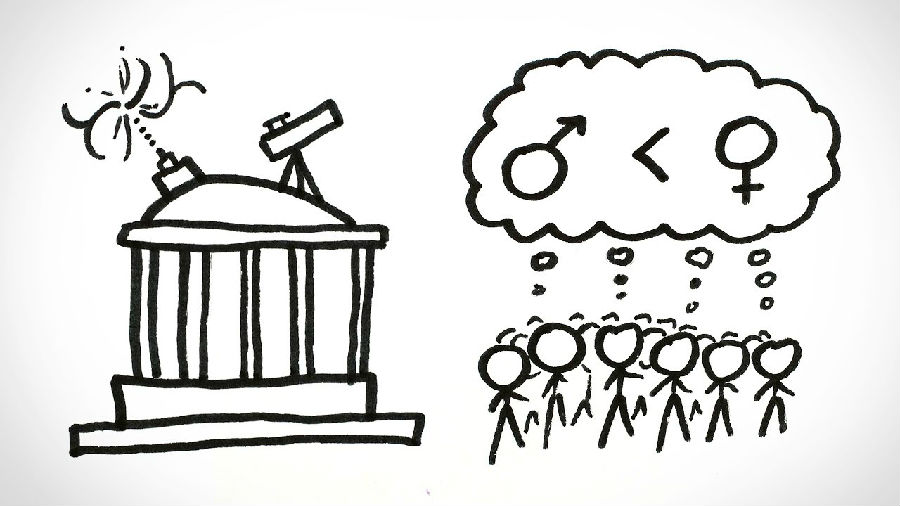Imagine a future cat-topia where both cats and people are applying to the physics and astronomy departments.
想象一下未来的喵喵乌托邦,猫和人都准备申请物理和天文系。
In astronomy, 2 cats are accepted and 2 are rejected, while 1 human is accepted and 1 is rejected.
在天文系,2只猫被录取,2只猫被拒绝,而1人被录取,1人被拒绝。
In physics 1 cat gets in and 2 don't, while 2 humans get in and 4 don't.
在物理系,1只猫录取,2只猫被拒绝;而2人被录取,4人被拒绝。
So, overall at the university, 3 cats are accepted and 4 rejected for a 43% acceptance rate,
总体而言,3只猫被录取,4只猫被拒绝,录取率为43%,
while 3 humans are accepted and 5 rejected for a 38% acceptance rate.
3人被录取,5人被拒绝,录取率为38%。
Is the university discriminating against humans in its application process? Possibly not.
大学在录取过程中歧视人类学生了么?可能没有。
That's because if each department reviews its own applications, then the numbers show
这是因为如果每个系审查自己的申请人,数据会显示
that the astronomy department lets in 50% of cats and 50% of humans, which seems fair,
天文系人类和猫录取皆为50%,看起来很公平,
and the physics department lets in 33% of cats and 33% of humans, which again seems fair.
天文系猫是33%,人类也是33%,也很公平。
The reason, then, for the apparent unfairness at the university level
大学整体录取不公平的原因
is the imbalance in how many cats and humans apply to each department:
是各个系猫和人类申请人数的不平衡:
more of the cats applied to the astronomy department, which happened to let in more applicants regardless of species,
申请天文系的猫更多,碰巧被录取的猫也更多,和种族无关,
while more of the humans applied to physics, which let in smaller applicants.
申请物理系的人更多,所以录取至天文系的人少。
This situation is another illustration of Simpson's statistical paradox,
这种情况是辛普森统计悖论的另一个例证,
and something like it actually happened at Berkeley in the 1970s,
20世纪70年代类似的事情在伯克利发生了,
which realized it was letting in 44% of men applying to the graduate school, but only 35% of women.
申请研究生的男性录取率为44%,女性只有35%。

Careful analysis was able to show that women tended to apply more to departments that had less funding and fewer places, like English,
仔细分析会发现女性更多的会申请经费少、职位较少的专业,比如英语,
and men tended to apply more to less competitive departments, like engineering.
而男性更多地会申请竞争较少的系,如工程系。
Thus within each department (which was the level at which applications were evaluated),
因此每个系内(也就是申请人评估的等级),
there wasn't obvious evidence of gender discrimination among applicants – if anything, women were favored.
没有申请人性别歧视的明显证据——如果有,也是对女性更有利。
And yet, the unequal distribution of women and men across departments
各系男女比例不均衡的所导致的的结果是
resulted in an unequal distribution of women and men at the university overall.
大学内整体男女比例不均衡。
The question, then, is what caused the unequal distribution of women and men to begin with?
那么问题是一开始是什么导致了男女比例的不均衡?
One can of course imagine a sinister institution that konws how Simpson's paradox works
当然,我们可以想象一个邪恶的机构,该机构知道辛普森悖论如何运作,
and wants to discriminate against a particular group, all they have to do is advertise smaller, and more competitive departments
也想要歧视某个特定群体,他们所需要做的就是着力向该团体
more heavily to that group, and vice-versa for groups they want to promote.
宣传更小更具竞争力的专业,反之亦然。
More realistically, certain departments or fields may have reputations for being unwelcoming and unsupportive towards women
更现实的情况是,某些专业或领域可能有不欢迎和不支持女性的名声
even if they let them in fairly, and it's also possible that other aspects of a university itself
即便他们因为公平录取了女性,并且也有可能一所学校的其他方面
attract applicants who are more likely to follow gendered career stereotypes.
吸引了那些有性别刻板印象的申请人。
But ultimately, as the Berkeley study concluded, the problem is a bigger, societal, one:
最后,如伯克利研究所总结,一个更大的社会问题是:
The absence of a demonstrable bias in the admissions system does not give grounds for concluding
招生系统中没有明显的偏见,但这并不能作为得出教育过程中
that there must be no bias anywhere else in the educational process.
其他任何地方都不存在偏见的结论依据。
"Women are shunted towards fields of study that are generally more crowded, less productive of completed degrees,
“女性更容易被分到人更多、毕业率更低、
less well funded, and that frequently offer poorer professional employment prospects…"
资金更少、就业前景不理想的研究领域。”
Those words were written in a statistics paper in 1975.
这些话被写在1975年的一份统计文件中。
And more recent statistics tell us that they still remain true today -
更多近期的数据告诉我们至今仍是如此——
which is unfortunate if you think women and men should have equal opportunities and/or be paid equally for equal work.
这对那些认为男女机会应均等,同薪同酬的你们而言,很不幸。
So the paradox isn't really in the statistics, since after careful analysis, the statistics tell us we're biased
因此,矛盾之处并不存在于统计数据中,因为经过仔细的分析,统计数据告诉我们,我们是有偏见的,
and even hint at where those biases are (or aren't) coming into play.
甚至暗示这些偏见在哪里有(或没有)发挥作用。
No, the paradox is that we've remained so reluctant to fight our biases, even when they're put in plain sight.
不是的,矛盾之处在于,我们一直不愿与自己的偏见作斗争,即使它们被暴露在公众面前。


